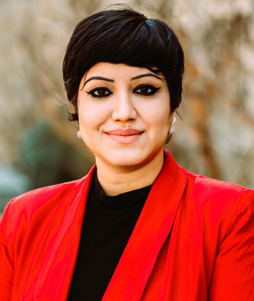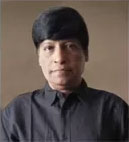
Ms. Suman Chandra, an officer of the 2010 IAS batch, stands true to the fact that a good administrator knows the way, goes the way, and shows the way. Through a slew of initiatives, some truly maverick, the Yale scholar has given ample evidence that she does not hesitate to shun the beaten path and explore ideas out of the box.
Dreams turn into reality when one possesses a vision that is characterized by the willingness to work hard, a desire for excellence, and a belief in being a responsible member of society. Excellence endures and sustains. It goes beyond motivation into the realm of inspiration. Ms. Suman Chandra, an officer of the 2010 IAS cadre, presently posted as the Managing Director of Haffkine Bio-Pharmaceutical Corporation Ltd (HBPCL), exemplifies these attributes in letter and spirit with a meritorious academic record that has found traction in her professional calling as a Civil Services officer.
As a Fulbrighter, Yale Alum, Amateur Film-maker and passionate about Climate Science, Ms. Chandra brings to her office a rich and diverse experience in leadership, community engagement, development administration, and policy making. Committed to a carbon-neutral future for the world; and working at the intersection of public service delivery, science-based target setting, and providing cutting-edge policy solutions for a resilient future, she leads an organization that has strived consistently on providing public health solutions.
Having completed her MPhil from Delhi University and Master’s from the prestigious Yale School of Environment after being an Exchange Student at the University of California, she was ideally cut out to handle the reins of public administration but surprisingly, by her admission, her sights were set on a career on Journalism, which was just as well perhaps, given her high degree of articulation of consummate writing skills. However, Journalism’s loss was Administration’s gain.
As she explains: “Civil Services were not on my radar. I was angling for a career in Journalism. I was handpicked by NDTV and Star TV through Delhi University’s campus placement cell. When I conveyed the good news to my father, he asked me how would it feel to be interviewed than interviewing others. It was not an off-the-cuff remark and as it happened, it changed the course of my life. Confabulations at home explored options like pursuing a career as a diplomat but finally, I zeroed in on IAS. There was a liberal atmosphere at home. My parents, least of all my mother, never pushed me into any decision. As it were, my sisters had charted out diverse professional territories and there was no pressure.”
Ms. Chandra’s induction into the IAS after a two-year rigorous training in Mussoorie began with a stint as Sub Divisional Magistrate (SDM) in Nandurbar, followed by Project Officer, Integrated Tribal Development Project at Nanded, Chief Executive Officer Zilla Parishad Osmanabad, Chief Executive Officer, Maharashtra State Rural Livelihoods Mission (MSRLM) and Joint Resident Commissioner, Maharashtra Sadan (Delhi) before holding the present incumbency. Her postings gave her wide exposure to the rural side with programs focusing on sustainable development, climate-resilient future planning, micro-finance, and poverty alleviation while her specializes lies in matters relating to Sustainable Development, Climate Change Adaptation, Energy Efficiency, Budgeting, Strategic Planning, Environmental Management Systems, Healthcare, Education, Urban Planning, Leadership, Project Management, Water Resource Management, Renewable Energy among others.
“Each posting is a new learning curve and its attendant challenges. There are newer realities you are faced with. The best part is you see the results of your actions. It is a great canvas to work on. You constantly reinvent yourself and become more resolute in your endeavors. Of course, at times as a woman, you encounter gender and social biases. The system is such that males accelerate faster professionally but it is up to you to adapt and integrate into the system. During my postings, I experienced that rural folk (read tribals) displayed a more egalitarian society, unlike the urban and so-called modern society.”
Ms. Chandra recalls the fond memories of her first posting where she could get hostels built for boys and girls and ameliorate the plight of malnourished children. “It parallelly called for monitoring women’s health in the prenatal stage. In Osmanabad, Project Urja focused on women’s development. It involved educating women and to make them aspirational through the multifarious roles they play.”
The conscientious officer strongly feels that “we are a reflection of the society we come from. As agents of change, it devolves upon us to strengthen the societal fabric, and improve future generations. I have no regrets about the journey traveled thus far. It has been a great learning curve and an amazing journey. In Osmanabad, I got the third gender to work as sanitation warriors. It is well documented and there was a sense of fulfillment in knowing that it was an experiment replicated elsewhere. These are the kind of institutional changes that translate into accolades if that is how one defines the word.”
One sunshine episode that Ms. Chandra reminisces as the Collector of Buldhana district is ‘Pink Week’ where she successfully tested a hitherto unexplored idea of making school girls as ‘Nanhi Collectors’ for a day to inspire and empower them. In the run-up to International Women’s Day, visitors to the Collectorate were pleasantly surprised to see young school girls in uniform sitting in the Collector’s chamber and discharging their duties in all seriousness. “I formally introduced the girls to the staff, escorted them to the chamber and my seat from where they oversaw the work as a Collector. They interacted confidently with the local media, participated in Lokshahi Din, expressed concerns over the unseasonal rains that hit the district, and guided the concerned officials to ensure that necessary help reaches the affected farmers. I even presented them with a formal letter, ‘handing charge’ to them for the day, as part of the ‘indicative collectorship’ which may even cement their secret ambitions to become an IAS officer in the future.”
She adds: “It’s not a question of taking any official decision — that’s my job — but the idea was to give them a slice of experience of what are the actual duties of a Collector, how to meet and interact with hundreds of people coming with their problems and how the day’s work is planned etc.” The experiment, considered the first of its kind in the country, caught the imagination of social media with laurels pouring in for Ms. Chandra and her Nanhi Collectors’.
Explaining the rationale behind the move, Ms. Chandra says: “The girls will be more confident, aware of their future goals, and most importantly, they will motivate other girls and family members to perform better and shatter glass ceilings. It’s also a process for their immersion in governance at an early age, with ‘seeing is believing’ being the ground reality.” The Pink Week also focused on women’s health on the premise that “a woman in the pink of health also helps keep the society in the pink of health.” Women of the district were screened for anaemia, cancer, and other diseases for follow-up treatment as part of the exercise.
A strong votary of environmental conservation, Ms. Chandra speaks passionately about climate change and urbanisation as two of the most important phenomena facing the world and says they are inextricably linked. According to her, India ranks fourth in the list of countries that produce the highest greenhouse emissions and this could be a result of massive urbanisation. “We are on the cusp of a rapidly changing world and we need to prioritise sustainable living and make it a part of our lifestyle in order to protect the planet. Planned urbanisation in countries such as India could serve as a great adaptation method.”
There is a third dimension to Ms. Chandra’s personality – that of an ace documentary filmmaker. Her docufilm ‘Climate Orphan” screened at the Ezra Styles Film Festival in 2021 and was adjudged as the best and won rave reviews. “Climate change issues deserve compelling attention and we need to shun the copy-paste model of western development,” she pleads with ardour.
As someone who has given an estimable account of herself as an administrator in a relatively short span, Ms. Chandra finds a welcome diversion in adventure sport – rock climbing, target practice et al. “I am a pahadi grown up in the Himalayas. For us born and brought up in the hills, adventure is also about survival instincts and skills. I love writing poetry. My first novel is a work in progress.” Her eloquence and fluency give them a cutting edge.
Ms. Chandra has also served as a Guest Professor and Associate Professor at Delhi University in 2009 teaching Practical Ethics, Logic, and Western Philosophy. It was just the beginning of a professional pilgrimage that testifies to the aphorism that example is better than precept.

A Column By
Raju Korti – Editor
The Resource 24X7
A Journalist With 4 Decades of Experience With Leading Media Houses.
